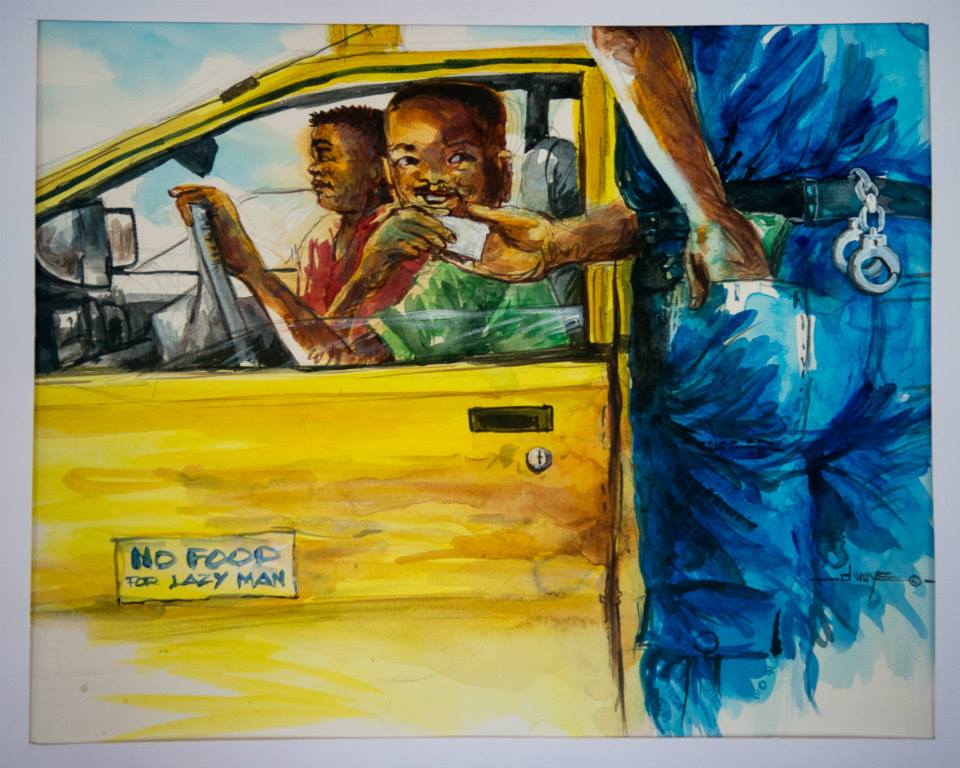On the morning of Monday, August 1, I was driving to an important meeting when I noticed the lead car for the presidential motorcade veering across lanes in an attempt to scare drivers off the road, in anticipation of the president.
It worked, and I hurriedly pulled off to the right of the road. One after the other, the mostly black SUVs in the presidential motorcade passed, swerving from lane to lane as they appeared to be jostling for position. Any resident of Monrovia is likely to be very familiar with this routine. It seems like an unnecessary maneuver that could endanger the president’s life, but, hey, this is LIB, right?
After the cars had passed, I proceeded back onto the road, with the last car in the motorcade about four or five car lengths ahead of me. I was so focused on rushing to my meeting, as I feared I would be late, that I hadn’t been thinking about how close I was. I would later find out, this was too close.
The vehicles began to turn into the Foreign Affairs building, which also serves as the President’s office while the executive mansion has been undergoing a neverending renovation.
A slender older man, likely in his late 40s to 50s and approximately 5’7†in height, was the main person in charge of halting traffic and directing the motorcade into the compound.
After he finished letting the president’s convoy in, he vigorously shook his finger at me, and I knew then that I was in trouble. While blocking my path, he motioned for me to park to the side. I reluctantly did so. After all, there was no way for me to just speed past him.
Then he entered the car from the passenger side and told me to drive a little out of the way into the University of Liberia back entrance. I did his bidding. He then told me that I was breaking a rule that forbids anyone from being closer than 100 yards behind a presidential convoy.
This raised an interesting question in my head about how ordinary Liberians find out about the country’s various rules and regulations when a good number of them are not published anywhere for the public to access, and they are not available in public libraries.
Forget about that for now. My government appointed co-pilot was now telling me that he needed to impound the vehicle and take me to the police headquarters to pay a US$100 fine. He asked for my driver’s license and vehicle insurance papers, which I provided, and when he was satisfied with them, he gave me all the documents and kept the license.
Now, the police told me since the car was properly registered and insured, all I needed to deal with was the fine, which suddenly became US$50 at this point. I decide to shut my mouth and not point out the discrepancy in his statements.
At this point, I was getting really concerned about my super important meeting. I knew if I went to the police headquarters, it would take me a long time. Additionally, I wasn’t sure if I would be allowed to leave with the car. I certainly wasn’t going to leave it with these fools, I thought. He told me there was no option for him to write me a ticket and have me pay later – he had to impound the car immediately.
I instantly recognized that this was what I call a ‘bribe moment.’ These are the situations when bribes are justified, right? After all, why make the process of paying a fine to the government so onerous when there are hungry vultures like my friend waiting to take advantage?
After I had brought up the prospect of bribing him, I noticed he didn’t flinch. For some reason, I assumed that the closer people worked to the president, the more honest they would be. I offered US$10, only because I didn’t have a US$5 note and everybody knows that with bribery, you don’t get change – although I was very tempted to ask.
He counter bargained and told me to make it US$30. That annoyed me a bit. I emptied all my pockets and explained to him that the US$10 was all I had, besides the L$130 (US$1.35) on me. He told me to give him the local currency too. At this point, I thought he was being too greedy, and the tone of my voice morphed from pleading to firm. I had pulled my phone out to start recording earlier, and I knew that if he tried anything, I would have him on record.
I told him that I needed to have some cash on me as I was heading to a meeting in town. I refused to give him what I had in local currency. He was pacified and left the car.
Indeed, people like me are a reason why corruption persists in society. By paying the bribe, I was contributing to normalizing a vice that needs to be rooted out. However, I couldn’t help but reflect on the situation and thought how sad it was that the government lost out on potential revenue. I mean, when I lived in Virginia in the US, at one point, I ended up paying $200 in tickets over three months for parking and traffic violations.
Every day in Liberia, there are probably thousands of cases where citizens are caught breaking the law and get away with it by paying bribes. Even for the ones like me who would be fine with receiving a ticket and paying the fine, the process is so burdensome that it pushes us to the corrupt path.
Now I understand that this a complex problem to solve and there is not only one solution, but I worry that it’s not being handled as a priority.
Part of solving this problem would be a good addressing system, which would allow the government to know where people live, in addition to making it easy to mail traffic violation tickets. A related crucial part of fixing the problem would be ensuring that all residents have a unique number, akin to the social security number in the United States. Equipping most police with the ability to check criminal and driving records would also be important to catch individuals who are repeat offenders but aren’t paying the fines.
These systems together would probably ensure that the government can feel comfortable issuing me a ticket, knowing that if I don’t pay, there will be repercussions for me.
After all, some of us lawbreakers are perfectly fine with paying for our crimes; but if the penalty is unreasonably arduous and we have alternatives, best believe that we’ll pay the bribe.
Featured image of “Cold Water†by Frank Dwuye, courtesy of Jim Tuttle



